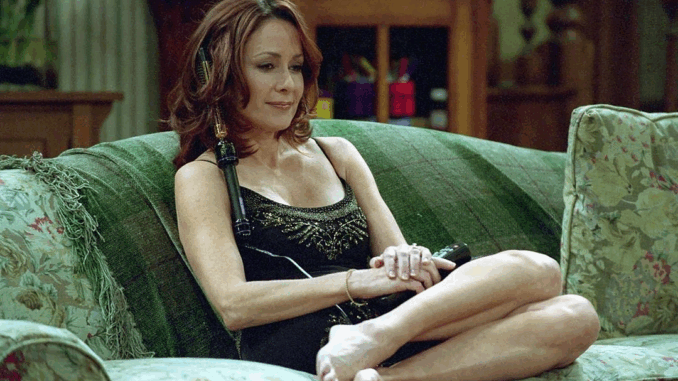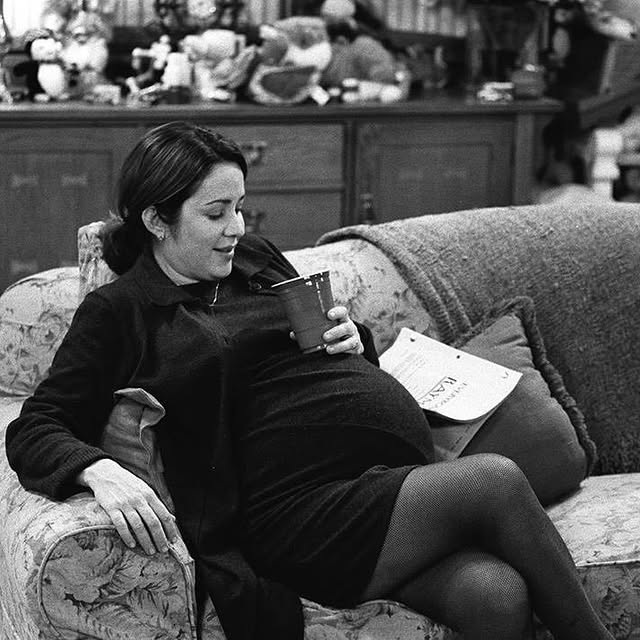
Everybody Loves Raymond is one of television’s most celebrated sitcoms, thanks to its humor, relatable family dynamics, and the incredible chemistry between its cast. But not every moment behind the camera was smooth sailing. At one point, the show’s future hung in the balance when Patricia Heaton, famously portraying Debra Barone, purposely called in “sick.”
This article dives into the behind-the-scenes tensions, why Heaton took such a bold step, and how the situation ultimately shaped the show’s legacy.
1. Patricia Heaton: More Than Just Debra Barone
Patricia Heaton’s role as Debra Barone was central to the sitcom’s success. She was not only a comedic powerhouse but also a dedicated professional who cared deeply about the integrity of the show.
Her decision to call in sick wasn’t out of laziness—it was a statement about her concerns regarding working conditions and dynamics on set.
2. The Stress of a Long-Running Sitcom
By the later seasons, the pressures of filming nine seasons took their toll. Long hours, tight schedules, and creative disagreements can create a tense environment, even among the most talented cast.
Heaton’s choice reflected the human side of dealing with burnout and unresolved conflicts on a high-profile set.
3. Behind-the-Scenes Conflicts
Sources reveal that tensions between cast members, writers, and production staff occasionally boiled over. Patricia Heaton, being a strong-willed actor, felt that some issues needed to be addressed rather than ignored.
Calling in sick became a way to pause, signal her concerns, and encourage management to evaluate the situation.
4. How a Sick Day Can Impact a Show
When a lead actor calls in sick, especially one as pivotal as Heaton, production schedules can be thrown into chaos. Episodes may need to be rewritten, shooting dates rescheduled, and other actors adjust their performances accordingly.
The stakes were high: a prolonged absence could have jeopardized not just one episode but the continuity and quality of the show.
5. The Ripple Effect on Cast and Crew
Heaton’s absence forced the entire team to reassess dynamics. While some were frustrated, many recognized the importance of addressing the underlying issues.
It was a moment of reflection that ultimately contributed to better communication and collaboration moving forward.
6. Balancing Professionalism with Personal Boundaries
Calling in sick on purpose can be controversial, but it also demonstrates the importance of setting boundaries. Heaton prioritized her well-being while also signaling that the behind-the-scenes issues needed resolution.
7. Executive Response
Network executives and producers had to act quickly. They mediated discussions, ensured schedules were maintained, and worked to address concerns raised by Heaton.
Their response was critical to keeping the show on track and avoiding potential long-term fallout.
8. Impact on Ratings and Audience Perception
Interestingly, audiences were unaware of the behind-the-scenes drama. Everybody Loves Raymond continued to deliver consistent humor and storytelling.
This demonstrates how professional teams can manage crises effectively without affecting the viewing experience.
9. Lessons in Conflict Resolution
Heaton’s actions highlight the importance of addressing issues proactively rather than letting resentment build. Conflict resolution is essential in collaborative environments, especially in high-pressure industries like television.
10. The Strength of the Cast Ensemble
Despite tensions, the cast’s chemistry remained strong. Brad Garrett, Ray Romano, Doris Roberts, and Peter Boyle continued to perform brilliantly, showing that a committed ensemble can weather behind-the-scenes challenges.
11. The Role of Writers and Directors
Writers and directors had to adapt quickly to accommodate Heaton’s absence. This flexibility ensured that the creative vision of the show remained intact and that episodes maintained quality and continuity.

12. Why Heaton Took a Stand
Patricia Heaton’s decision was not impulsive. It stemmed from a desire to maintain the show’s quality and her own professional integrity.
Sometimes, taking a stand—even in unconventional ways—can lead to meaningful change.
13. Resolving the Tensions
After the incident, conversations between Heaton, the producers, and fellow cast members helped clear misunderstandings and improve communication.
This resolution reinforced the importance of open dialogue and mutual respect on a collaborative set.
14. How the Show Survived the Crisis
Everybody Loves Raymond not only survived the incident but continued to thrive. The show’s ratings remained strong, and the behind-the-scenes drama faded as the team refocused on delivering high-quality episodes.
15. The Importance of Mental Health in Hollywood
Heaton’s actions underscore a broader point: the importance of mental health and self-care in demanding careers. Burnout can affect performance, creativity, and personal well-being, and addressing it is essential.
16. Long-Term Lessons for Television Production
Producers learned that maintaining a healthy work environment is crucial. This incident highlighted the need for better communication, flexible scheduling, and attention to actor concerns to prevent future conflicts.
17. How Fans Benefit From Set Discipline
While fans may never know the specifics, Heaton’s stand ensured that the show remained authentic, funny, and emotionally engaging. The quality viewers enjoyed was protected by her actions behind the scenes.
18. Protecting the Legacy of Everybody Loves Raymond
By addressing the tensions, Heaton helped safeguard the show’s legacy. The sitcom remains celebrated for its humor, relatability, and professional excellence—qualities reinforced by how challenges were managed off-screen.
19. Reflection on Heaton’s Leadership
Calling in sick was a form of leadership. Heaton demonstrated courage, self-respect, and a commitment to quality, showing that actors can influence production positively, even in difficult circumstances.
20. The Show’s Continued Success
Despite the temporary uncertainty, Everybody Loves Raymond continued to air for several more successful seasons. Behind-the-scenes challenges like this one didn’t derail the show—they strengthened the commitment of those involved.
Conclusion
Patricia Heaton’s purposeful sick day serves as a reminder that even in highly successful productions, tensions can arise. By standing up for herself and prioritizing communication, she helped ensure the show maintained its quality and integrity. Everybody Loves Raymond went on to remain one of television’s most beloved sitcoms, proving that sometimes, addressing problems head-on is essential for long-term success.
FAQs
1. Why did Patricia Heaton call in sick on purpose?
To address behind-the-scenes tensions and protect her well-being while ensuring the show maintained its quality.
2. Did this threaten the show’s continuation?
Temporarily, it raised concerns, but the team resolved the issues, and the show continued successfully.
3. How did the cast react?
The cast understood the importance of addressing the tensions and continued to collaborate effectively.
4. Did this affect the show’s ratings?
No, episodes aired as planned and the audience remained unaware of the behind-the-scenes conflict.
5. What can other productions learn from this incident?
It highlights the importance of open communication, conflict resolution, and prioritizing mental health in high-pressure environments.
